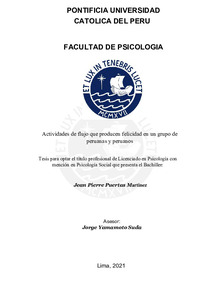| dc.contributor.advisor | Yamamoto Suda, Jorge Martín | |
| dc.contributor.author | Puertas Martinez, Jean Pierre | |
| dc.date.accessioned | 2022-06-22T15:55:16Z | |
| dc.date.available | 2022-06-22T15:55:16Z | |
| dc.date.created | 2021 | |
| dc.date.issued | 2022-06-22 | |
| dc.identifier.uri | http://hdl.handle.net/20.500.12404/22665 | |
| dc.description.abstract | El estudio de las actividades que producen felicidad ha sido investigado desde la psicología
positiva. Se ha encontrado evidencia de que ciertas actividades llevan a un estado mental
inconsciente compuesto por nueve factores (establecimiento de metas y objetivos,
retroalimentación autorrealizada, fusión entre la actividad y la consciencia, pérdida de la
noción del tiempo, disminución de la autoconsciencia, equilibrio entre el desafío y la habilidad,
atención y focalización en la actividad, y sensación de control y experiencia autotélica). Este
estado de flujo es el que produce una felicidad muy potente. No obstante, según el contexto, se
hallan particularidades propias de la región y cultura.
En el Perú, no hay investigaciones sobre las actividades de flujo que producen felicidad. Por
tanto, el objetivo de la presente investigación es identificar y analizar aquellas actividades que
generan mayor experiencia de flujo y contribuyen a la felicidad de un grupo de peruanos. Los
participantes fueron 47 (20 hombres y 27 mujeres). Se utilizó una metodología cualitativa
utilizando la técnica del análisis de contenido para así obtener una descripción cuantitativa de
las respuestas. Las preguntas estuvieron dirigidas a indagar sobre qué actividades o situaciones
han llevado a experimentar flujo y cómo te sentías en esta actividad o situación. Los resultados
concluyeron que hay una similitud con los estudios previos con respecto a la primera pregunta;
sin embargo, también se encontraron diferencias y características propias del Perú con respecto
a la segunda pregunta (el flujo no es tan competitivo y de logro, sino más de disfrute y social). | es_ES |
| dc.description.abstract | The study of activities that produces happiness has been investigated from a positive
psychology. Evidence has been found, certain activities that take people to a mind state
composed by 9 factors (goals and objectives establishing, self-made feedback, activity and
conscience fusion, time notion lost, self-conscience reduction, balance between challenge and
skill, attention and focus on the activity, control sensation and autotelic experience). This state
of flow is the one that produces powerful happiness. Nevertheless, according to the context,
there obviously are particularities about region and culture. In Perú, there are no investigations
about activities of flow producing happiness. Therefore, the main objective of this work is to
recognize those activities that create higher experience of flow and contribute to the joy of a
group of Peruvians.
47 participants have been part of this research (20 men, 27 women). Qualitative methodology
was used, taking advantage of the technique of analysis of the content in order to have a
quantitative description from the answers. The aim of the questions was about looking into
what activities or situations generate flow and how people feel doing them. Results show a
similarity between previous studies and this one, when the first question was given, although,
there are differences and proper characteristics of Perú regarding the second question. (Flow is
not that competitive or about achievements, but about enjoyment and social). | es_ES |
| dc.language.iso | spa | es_ES |
| dc.publisher | Pontificia Universidad Católica del Perú | es_ES |
| dc.rights | info:eu-repo/semantics/openAccess | es_ES |
| dc.rights | Atribución-CompartirIgual 2.5 Perú | * |
| dc.rights.uri | http://creativecommons.org/licenses/by-sa/2.5/pe/ | * |
| dc.subject | Psicología positiva | es_ES |
| dc.subject | Felicidad | es_ES |
| dc.subject | Peruanos--Aspectos psicológicos | es_ES |
| dc.title | Actividades de flujo que producen felicidad en un grupo de peruanas y peruanos | es_ES |
| dc.type | info:eu-repo/semantics/bachelorThesis | es_ES |
| thesis.degree.name | Licenciado en Psicología con mención en Psicología Social | es_ES |
| thesis.degree.level | Título Profesional | es_ES |
| thesis.degree.grantor | Pontificia Universidad Católica del Perú. Facultad de Psicología | es_ES |
| thesis.degree.discipline | Psicología con mención en Psicología Social | es_ES |
| renati.advisor.dni | 08755216 | |
| renati.advisor.orcid | https://orcid.org/0000-0002-8665-4405 | es_ES |
| renati.author.dni | 73256422 | |
| renati.discipline | 313066 | es_ES |
| renati.juror | Mogravejo Sanchez, Jose Amilcar | es_ES |
| renati.juror | Gonzalez Riesle, Alvaro | es_ES |
| renati.juror | Yamamoto Suda, Jorge | es_ES |
| renati.level | https://purl.org/pe-repo/renati/level#tituloProfesional | es_ES |
| renati.type | https://purl.org/pe-repo/renati/type#tesis | es_ES |
| dc.publisher.country | PE | es_ES |
| dc.subject.ocde | https://purl.org/pe-repo/ocde/ford#5.01.00 | es_ES |






